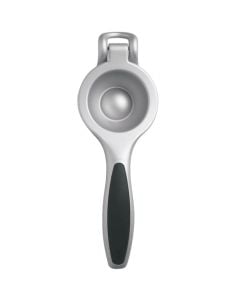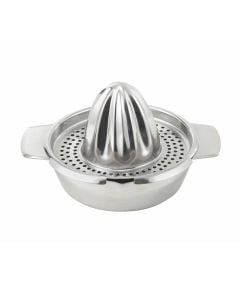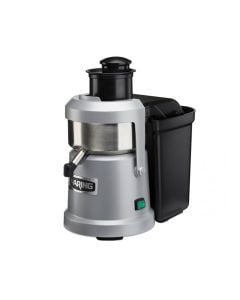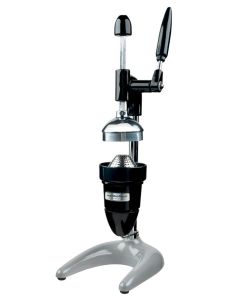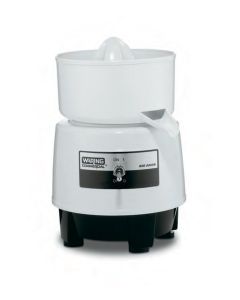Juicers & Juice Extractors
Looking for the best juicers on the market? We offer a variety of high-quality juicers and juicer machines that are efficient, durable, and easy to clean. Perfect for both commercial and home use, these juicers are designed to handle your beverage needs with ease, helping you quickly serve fresh juices while ensuring long-lasting performance and reliability.
Types of Juicer Machines and How They Work
Simply put, a juicer is a piece of equipment used to help separate juice from the pulp of fruits and vegetables.
The two most common types of juicers are centrifugal juicers and masticating juicers. Centrifugal juicers are often used as home juicers because they are more affordable than masticating juicers. It works by cutting up the fruit or vegetable using a flat cutting blade. This juicer then spins the produce at a high speed in order to effectively separate the juice from the pulp. In contrast, a masticating juicer utilizes an auger to crush and mash the fruit or vegetable into smaller pieces before the juice is squeezed out of the produce, using a built-in screen while the pulpy remains of the produce are expelled through a separate outlet. This type of juicer is considered more efficient and produces more juice. As such, most commercial juicers are masticating juicers.
How to Properly Clean a Commercial Juicer
To keep your juicer machine in great condition so you can produce excellent-quality juice every time, you will need to properly clean it. It is quite easy to properly clean your juicer, and the cleaning method can be used for both commercial juicers and home juicers, so everything should be a breeze.
For cleaning your juicer, you will need the following: water, a soft brush, some dish-washing soap, dishcloths, and a spatula.
First, make sure to unplug your juicer machine. Then, proceed to disassemble the juicer completely, making sure to follow the instructions in the manual provided. Look for the container or bin that holds the produce pulp, and scrape away unnecessary pulp with the spatula. Next, rinse every piece of equipment with running water. You can use cleaning brushes to clean the areas of the juicer that are difficult to reach. It is also a good idea to focus more on cleaning and washing the mesh strainer as pulp and other debris from the produce can build up quickly in this specific part of the juicer.
Use a soft, clean dishcloth to wipe away dirt, dust, and dried juice from the machine itself. Lastly, allow the pieces of juicer that you washed to dry completely. Reassemble the juicer based on the instruction manual, and use as needed.
Hamilton Beach Juicers and Waring Juice Extractors
Here at Rapids, we have both commercial juicers and home juicers available. Our top-rated juicers include the Hamilton Beach Juice Extractor and the Waring Commercial Juicer. The Hamilton Beach Juice Extractor is a manual juicer that nevertheless offers reliable and efficient juice production. This juicer is heavy duty, easy to clean, and has a removable strainer cone and funnel. The Waring Commercial Juicer, on the other hand, features a heavy die-cast base and a quiet running motor. The bowl and reamer of this juicer can be easily lifted off for convenient cleaning. The reamer fits all citrus fruits, and a one-liter serving container is included.
Overview of Juicers
Whether you are looking for a commercial juicer, a cold press juice extractor, or a citrus juicer, there are options suited for different needs:
- Cold press juicers are ideal for maximum juice yield and minimal oxidation.
- Centrifugal juicers are perfect for quick orange juice or fruit juicing at home.
- Industrial juicers handle high-volume production in restaurants, juice bars, or other commercial settings.
- Juice extractors and cold press juice extractors are designed for versatility and consistent results with various fruits and vegetables.
Types of Juicer Machines and How They Work
Simply put, a juicer machine is equipment designed to separate juice from the pulp of fruits and vegetables efficiently. If you are wondering what's a good juicer, it depends on whether you need a home juicer or a more robust commercial solution.
The two most common types of juicing machines are centrifugal juicers and masticating juicers. Centrifugal juicers are often used as home orange juice machines because they are more affordable. They work by cutting up the fruit or vegetable with a flat cutting blade and spinning it at high speeds to separate the juice from the pulp.
In contrast, cold press juicers or industrial juicers utilize an auger to crush and mash fruits or vegetables into smaller pieces. The juice is then squeezed out through a built-in screen, while the pulp is expelled through a separate outlet. This type of commercial juicer is considered more efficient and produces higher yields. Many cold press juice extractors and juice extractors used in restaurants or juice bars fall into this category.
How to Properly Clean a Commercial Juicer
Maintaining your juicer machine ensures consistent quality and longevity. Cleaning methods are generally the same for both citrus juicers and larger industrial juicers.
You will need water, a soft brush, dish-washing soap, dishcloths, and a spatula.
- Always unplug the juice extractor before cleaning.
- Disassemble the juicer completely, following the instruction manual. Remove the container or bin that collects pulp and scrape out excess material with a spatula.
- Rinse all parts under running water, using brushes to reach tight spaces. Pay extra attention to the mesh strainer, as pulp and debris build up quickly here.
- Wipe the exterior of the cold press juicer with a soft, clean dishcloth to remove juice residue, dust, or dirt.
- Allow all washed parts to dry fully, then reassemble the juicer machine for your next use.
Proper use and regular cleaning of your juicer machine will ensure excellent-quality juice every time, whether you are producing fresh cold press juice at home or running a commercial operation.
Electric Juicers
Electric juicers are designed for efficiency, speed, and convenience, making them a top choice for busy kitchens, home use, or commercial settings. An electric citrus juicer or electric orange juicer can handle a wide range of fruits and vegetables, from lemons and limes to oranges, pomegranates, and even soft berries. These machines quickly separate juice from pulp, producing a smooth, flavorful beverage every time.
Benefits of Electric Juicers:
- High-speed juice extraction saves time and effort
- Built-in pulp filters for smooth, clear juice
- Suitable for a variety of fruits and vegetables
- Easy-to-clean removable parts
- Durable motors designed for frequent use
- Some models double as cold press juice extractors for nutrient-rich juice
How to Use an Electric Juicer:
- Cut the fruit to the appropriate size.
- Place the fruit onto the reamer or into the feed chute.
- Let the machine extract the juice automatically into a container.
With an electric juicer, even beginners can learn how to juice a lemon with an electric juicer or how to juice a pomegranate in an electric juicer without worrying about mess or wasted fruit. Many juice extractors and cold press juice extractors also include safety features, anti-drip spouts, and large pulp bins, making them ideal for home kitchens, offices, or juice bars.
Electric juicers are perfect for anyone who wants freshly squeezed juice at the push of a button. From citrus fruits to soft berries, these machines can handle a variety of juicing tasks efficiently, producing flavorful juice every time.
Manual Juicers
Manual juicers offer a hands-on, simple, and reliable way to extract fresh juice from citrus fruits and other produce. Unlike electric machines, manual juicers do not require electricity, making them portable, eco-friendly, and perfect for both home use and outdoor settings. Popular options include handheld lemon juicers, manual juice makers, Citrus Squeezers, lemon squeezers, and Manual Citrus Juicers. Each type is designed to make juicing effortless while giving you full control over the amount of juice and pulp extracted.
Advantages of Manual Juicers:
- No electricity required
- Lightweight and portable
- Precise control over juice and pulp
- Easy to use and clean
- Perfect for lemons, limes, and small oranges
How to Use a Manual Juicer:
- Cut fruit in half.
- Place the fruit in the squeezer.
- Press down to extract the juice directly into a glass or container.
Manual juicers are perfect for those who enjoy a hands-on approach to juicing. They are durable, lightweight, and easy to store, making them an excellent choice for small kitchens or for anyone who prefers simplicity over automation. A handheld lemon juicer or manual juice maker allows you to extract juice whenever needed without worrying about cords, motors, or complicated cleaning procedures.
Whether you’re preparing a refreshing glass of fresh orange juice, squeezing lemon for a marinade, or making lime juice for cocktails, a manual citrus juicer provides versatility, convenience, and precise control. This makes it a must-have tool for home cooks, chefs, or anyone who enjoys fresh, natural juice daily.

